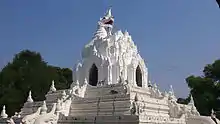Anauk Nanmadaw Ma Mya Lay
Thiri Maha Thuta Yadana Sanda Dewi (Burmese: သီရိမဟာသုတရတနာစန္ဒာဒေဝီ, Pali: Sīrimahāsutaratanā candādevī; born Ma Mya Kyote; 1809 – 1845), commonly known as Anauk Nanmadaw Ma Mya Lay (Burmese: အနောက်နန်းမတော် မမြလေး), was the Queen of the Western Palace of King Tharrawaddy during the Konbaung dynasty.[1]
| Anauk Nanmadaw Ma Mya Lay | |||||
|---|---|---|---|---|---|
| Queen of the Western Palace | |||||
| Tenure | 1837 – 1845 | ||||
| Successor | Thiri Maha Thu Sanda Dewi | ||||
| King | Tharrawaddy Min | ||||
| Born | 1809 Hinthada | ||||
| Died | 1845 (aged 35–36) Ava | ||||
| Consort | Tharrawaddy Min | ||||
| Issue | Hlaing Hteik Khaung Tin | ||||
| |||||
| House | Konbaung | ||||
| Father | Min Pyan Chi | ||||
| Mother | Me Ei | ||||
| Religion | Theravada Buddhism | ||||
She was a well-known female poet of the late Konbaung era, and is remembered as the composer of the popular patpyoe "Chit-Tha-Hmya-Ko" and for her tragic death.[2][3]
Life
Ma Mya Kyote was born in 1809 to Min Pyan Chi and Me Ei of Hinthada.
At age 17 she married Prince Tharrawaddy, who arrived in Danuphyu after signing the Treaty of Yandabo. In 1833, she gave birth to a daughter named Ma Phwar (later Crown Princess Hlaing).[4][5] When her husband ascended to the throne, Ma Mya Lay became the Queen of the Western Palace. She was given the title of Thiri Maha Thuta Yadana Sanda Dewi (Sirimahāratanā Candādevī) and received the appanage of Hinthada.
Death
In 1845, Ma Mya Lay was accused of involvement in the Pyay Prince rebellion. She was executed by her husband, who was reportedly suffering from schizophrenia; he ordered her to be trampled to death by an elephant.[6] Their daughter was adopted by Setkya Dewi, who later became the Chief Queen of King Mindon.
Donations

In 1843, Ma Mya Lay funded the reconstruction of Nagayon Pagoda in Amarapura. She also donated Yele Kusinayone Sutaungpyae Pagoda in Mandalay, two years before her death.
References
- တင်သန်းယု (2004). မြန်မာသမိုင်းမှ မဟေသီ၊ ဒေဝီ၊ ဧကရီများ (in Burmese). ကောင်းသန်းပုံနှိပ်တိုက်.
- Ūʺ.), Lha Puiṅʻ (Layʻ tī (1976). စတုဘုမ္မိကမဂ္ဂင်း သာသနာဝင်သမိုင်း (in Burmese). Doʻ Ma Ma Company ʼOṅʻ.
- "မြို့စားရွာစားရတဲ့ မြန်မာစာဆိုမယ်များ". BBC News (in Burmese).
- Pe Maung Tin (1938). မြန်မာစာပေသမိုင်း (in Burmese). ဇမ္ဗူမိတ်ဆွေပိဋကတ်ပုံနှိပ်တိုက်.
- ဒီးဒုတ် ဦးဘချို (in Burmese). ခေတ်မှီစာပေတိုက်. 1976.
- မြန်မာသမိုင်းသုတေသနစာစောင် (in Burmese). တက္ကသိုလ်များသမိုင်းသုတေသနဌာန. June 2004.
- "ချစ်သမျှကို ပတ်ပျိုးကို ဘယ်သူရေးသလဲ". The Irrawaddy. 5 April 2019.
- ဆွေ, နန်းညွန့် (1966). စာပေရိပ်မြုံ (in Burmese). Sanda Wīn.
- ညိုမြ (အိုးဝေ) (1997). ကုန်းဘောင်ရှာပုံတော် (in Burmese). မြဝတီစာပေတိုက်.
- စာဆိုတော်များအတ္ထုပ္ပတ္တိ (in Burmese). လောကစာပေ. 2002.
- ဆရာတင် (ဗေလုဝ) (1974). ဂီတာလင်္ကာရဒီပနီ၊ ဆောဂီတသိပ္ပံအခြေခံ (in Burmese). ဣစ္ဆာသယပိတကတ်စာ ပုံနှိပ်တိုက်.
See also
- Konbaung dynasty
- List of Burmese consorts